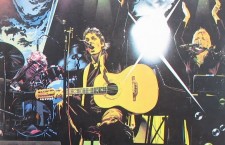With these two new reissues, Paul McCartney returns to a pair of albums populated by miniature delights and distracting whimsy. Whatever their faults, Venus and Mars and At the Speed of Sound remain, then as now, amiable artifacts from a time of deep domesticity for McCartney, this era when he finally seemed free of the weight of Beatledom. A stabilized Wings, which featured the same lineup on consecutive studio albums for the first time, synced up with an already-cozy family life to shower everything in this warm, inviting glow.
Of course, as with anything so small scale and homey, some of it falls flat. Some of it is just plain silly. But the bulk of it finds a path — stubbornly, maybe inexplicably — into your heart. Maybe it’s the way McCartney weaves an already-old-fashioned space-age theme into Venus and Mars, or the loose premise of a day around the farmhouse on At the Speed of Sound. Maybe it’s just McCartney being McCartney.
Remember, this period’s biggest hits (“Silly Love Songs,” “Listen to What the Man Said” and “Let ‘Em In”) tend to get cuffed around as being insufferably sleek, but approach them with new ears. He makes all of it worthwhile. There’s the limber, endlessly entertaining bass line on “Silly Love Songs,” which bears a passing resemblance to “Sha La La” by Al Green, and a punchy horn section that likewise powers “What the Man Said” and “Let ‘Em In.”
In truth, McCartney is incapable of making a completely uninteresting album, even when he sets his sights far lower than anything on the preceding Band on the Run, much less former bandmate John Lennon’s Plastic Ono Band. And we come there, obviously, to the crux of the matter. Paul McCartney did not emerge from that partnership ready to make bold statements, and as such didn’t find himself trying on as many personas as Lennon. Instead, McCartney sharpened and polished the one he already had: Master arranger and producer of hit singles, with a part-time gig as canny pop-music curator.
The latter is ably illustrated on these discs via the jauntily old-fashioned “San Ferry Anne” on Sound, the pre-war goof “You Gave Me the Answer” from Venus, and “Warm and Beautiful,” which from the beginning cried out for a classical re-arrangement that it eventually received. Elsewhere, he can be too cute by half, in particular on “Love in Song,” “She’s My Baby,” and the old-folks soap-opera themed coupling of “Treat Her Gently/Lonely Old People” and “Crossroads.” All of it combines to make McCartney seem rather provincial at times. Yet, he will confound expectations even while cunningly charming us, anyway.
After all, at the very same time, McCartney remained capable of creating with the passion and focus of Band on the Run. You hear it on “Call Me Back Again,” a simmering Venus and Mars deep cut that may be the best Wings song you’ve never heard — and the crunchy romp that is “Junior’s Farm,” a stand-alone single thankfully included on the bonus disc of this new reissue. Quibble all you want about the rest, but both tracks hold up well against the McCartney canon, and that’s no small thing.
Thus, just when he threatens to forever entangle us in minor disappointments, we forgive. And so it has been, really forever. Confounding, then charming: These mid-period Wings albums only confirm the notion. To expect anything different, even back then, is to misunderstand McCartney on a broad scale.
And so, we dig deeper and find the lost second-line fun of “My Carnival,” from the Venus package. Later tucked away as a b-side to imminently forgettable “Spies Like Us,” it illustrates McCartney’s chameleon-like ability to absorb different styles and make them his own. He similarly pushes himself into new places on “Beware My Love,” found on At the Speed of Sound, which unfolds with this remarkably layered complexity. Meanwhile, “The Note You Never Wrote” gives Denny Laine perhaps the best Wings vehicle he ever had.
That leads us, of course, to the final quibble about this era: Paul McCartney’s rather quaint insistence on sharing the spotlight. He took a democratic approach on both Venus and Mars and At the Speed of Sound, allowing the other members of Wings an unprecedented number of lead vocals, with an eye toward illustrating that this was a true band. Sometimes it works, in a continuation of a theme, and sometimes it doesn’t.
The late Jimmy McCullough gamely holds his own with “Medicine Jar,” but giving Joe English and Linda McCartney the microphone seems blatantly preposterous some four decades later. For proof, listen to Paul’s version of “Must Do Something About It,” a English-sung track found in demo form as part of the Speed extras. (Poor Joe is also shown up by John Bonham on an alternate version of “Beware My Love.”)
Still, McCartney’s approach finally allowed the criminally underused Laine to shine across a selection of tracks that also includes the spook-rock of “Spirits of Ancient Egypt” and the darkly sensuous “Time to Hide.” His presence proved crucially important, and not just because Laine more than makes up for whatever missteps may have followed from anyone here not named Paul. Wings would, despite this period’s determinedly familial atmosphere, almost disintegrate prior to 1978’s London Town — and it was Laine who helped the McCartneys rebuild once more.
- How Deep Cuts on ‘Music From Big Pink’ Underscore the Band’s Triumph - July 31, 2023
- How ‘Islands’ Signaled the Sad End of the Band’s Five-Man Edition - March 15, 2022
- The Band’s ‘Christmas Must Be Tonight’ Remains an Unjustly Overlooked Holiday Classic - December 25, 2016




